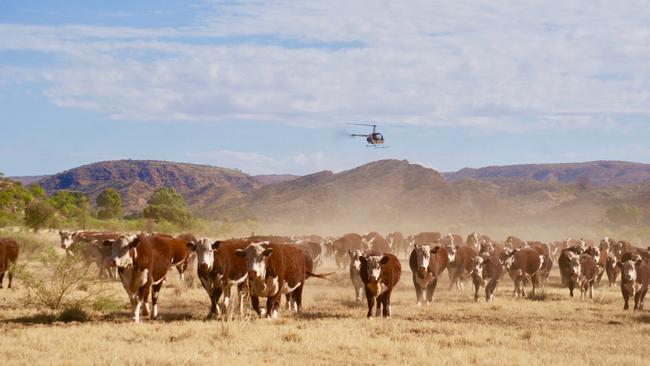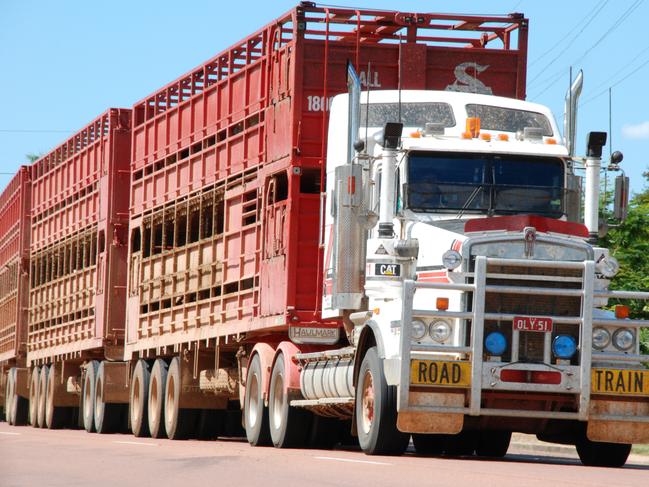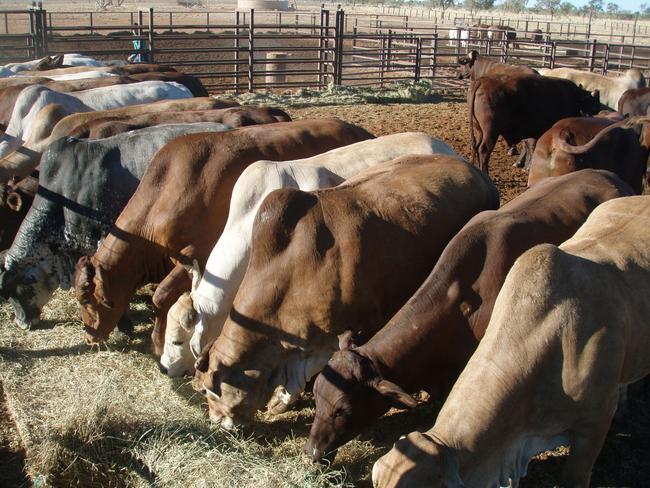PROLONGED drought conditions in the Barkly region are causing havoc with the Northern Territory’s cattle industry.
Stockfeed and water are running low following two failed wet seasons on the Barkly Tablelands.
The situation is so bad it has forced the emergency evacuation of around 500,000 cattle from the Barkly region.
AUSTRALIAN drought could hit NT pockets
BARKLY Tablelands run dry as pastoralists reduce cattle herds
The agriculture sector isn’t known for seeking any form of corporate welfare and to date Territory producers have not received any assistance.
But many are feeling the pinch when it can cost between $150 and $240 per head to move animals out of drought areas into markets.
It has been a desperate do or die step to save an industry that has been a shining light for the Northern Territory at a time when our economy continues to struggle.
It has been a massive logistical operation spearheaded by the NT Road Transport Association.
Its executive officer Louise Bilato told this week of how “pretty much every livestock truck from Western Australia, the Northern Territory, and Queensland has been working flat out to keep the heads of the pastoralists above water”.
“As the pastoralists are mustering, they haven’t got any capacity to hold the animals and so virtually the next day they need those animals to be moved,” she said.
The rescue mission is costing millions of dollars to undertake, sparking a plea for help from the Territory and Federal Governments — a plea that has in the main fallen on deaf ears.
NT Cattlemen’s Association chief executive Ashley Manicaros said with the Territory Government having no co-ordinated drought plan, Federal Government support was needed.
He said some producers were paying up to $250 per head to transport their cattle.
“They’ve moved cattle to agistment in North Queensland, which has recovered slightly, or further north into the Top End, but at some point they’re going to have to get those cattle back,” Mr Manicaros said.
“I was talking with an operator this week who estimates their transport costs will be about $10 million to do all that.
Federal Minister for Drought David Littleproud has given little joy to the Territory’s cattlemen.
“It’s a tough time for NT producers and the Federal Government is there to do our bit,” he said in a statement last week.
“Both federal and state governments have defined responsibility during drought. Freight and fodder assistance is the responsibility of state and territory governments. The Federal Coalition Government … has committed almost $7 billion towards our drought policy, including the $5 billion Future Drought Fund and Farm Household Allowance.”
However the Northern Territory Cattlemen’s Association president Chris Nott believes a long-term solution to drought is needed.
He says it is about building business resilience with the industry not necessarily looking for short term corporate welfare.
“There has been a lot of talk about the cattle being moved off the Barkly because of the lack of rain in that region, but we’ve had two years of below average rain in Central Australia as well and there has been a lot of cattle moved out of that region as well,” he said.
“The destocking which has occurred in the Barkly started back in February this year so the 500,000 number has to be put into some sort of context.
“The movement is proactive animal welfare and full credit to our land managers because we have been ahead of the game adjusting and destocking to avoid issues.
“All this comes at a cost and we have been carrying that cost alone. Luckily for the northern producers we’ve had the live export trade to send our cattle to overseas markets where there is strong demand.

“The Darwin Port has apparently recorded a more than 20 per cent increase in live exports across it since the start of the year. Many producers chose to send their product to south East Asian markets because sending them across to Queensland was not an alternative, firstly because of drought and then because of the floods.”
Mr Nott says it goes to show the value of having and maintaining a strong live export market.
“If our producers relied solely on a domestic market then we would be in all sorts of difficulties because of the ongoing dry in the eastern states,” he said.
“But we have managed to build strong relationships particularly in Indonesia and they appreciate the quality of our beef. The price has dipped slightly but that is because across Northern Australia from Townsville to Broome Northern beef producers are sending cattle out through live export.”
Mr Nott, a 35 year veteran of the pastoral industry in Central Australia, has seen the dry conditions and a raft of other, what he terms “exceptional circumstances”, over the years. He says the latest dry spell is affecting all of the Territory south of Katherine.
“For us, there has to be a longer term solution and I believe it should come in the form of a scheme that allows the pastoralist to put away a percentage, along the lines or the FMD scheme similar to how people save for superannuation, which can then be accessed in times of exceptional circumstances like droughts or major disasters like floods or bushfires,” he said.
“A scheme like this removes pressure from government to deliver handouts. We know the current NT Government has no real drought policy and it relies on the federal government to fund drought relief.
“And as we found out this week the Federal Government believes that something like a transport subsidy belongs to the NT Government so putting a scheme like this in place removes the politics.”

Mr Manicaros explained the Farm Management Deposits (FMD) scheme helped primary producers to deal more effectively with uneven income flows.
“It gives concessional tax treatment to deposits made during years of good cash flow, which can then be drawn on in later years when the funds are needed,” he said.
“FMD accounts are commercial products offered by financial institutions. The Department of Agriculture and Water Resources has policy responsibility for the scheme. The ATO is responsible for the administration of the tax aspects of the scheme.
“Generally, deposits you make into an FMD account are tax deductible if certain conditions are met.
“When you withdraw deposits that you previously claimed as a tax deduction, that amount is assessable income in the year it is repaid to you.”
What Chris Nott is proposing goes beyond that scheme.
“As it stands now the Territory community will feel the impacts of the drought and its costs through less spending in our regional towns,” Mr Nott says.
“As a $1 billion industry the revenue generated flows back into the NT in a number of ways. At a local level producers spend their income locally whether it is through fortnightly shops or by purchasing services. This in turn keeps people employed in the towns as the money flows through.
DON’T miss out: Amazing headphones offer for NT News subscribers
“But with increased costs and smaller margins there will be less money flowing into the economy and less reinvestment. And as we start to move into the latter part of the calendar year and 2020 we will face new challenges to meet product demand.
“When you destock a property due to poor conditions you are then faced with the challenge once conditions improve to the cost of restocking. Once again this is a cost which could be offset through the saving incentive scheme.
“People can argue all they want that the drought is about climate change but here in the Territory we’ve experienced these types of dry spells regularly. What we’ve never really done is build enough water storage infrastructure to offset what is happening.
“People hate the word dams but water storage takes in many forms including recharging of aquifers. The bottom line is that it hasn’t been done and we need to start being more aggressive in this area to add to our overall resilience.”


Add your comment to this story
To join the conversation, please log in. Don't have an account? Register
Join the conversation, you are commenting as Logout
Gaps in Darwin maternity services highlighted through stories of loss
Darwin families are making plans to leave the NT as shocking testimonies reveal gaps in maternity care, with some mothers seeking help four times before tragedy struck.
Three Territorians, one lifesaving legacy as RLSS turns 60
From tea with the Queen to fighting for free swimming lessons, Daphne Read fought for six decades to stop NT kids from drowning while RLSS member Michael De Silva nearly did.